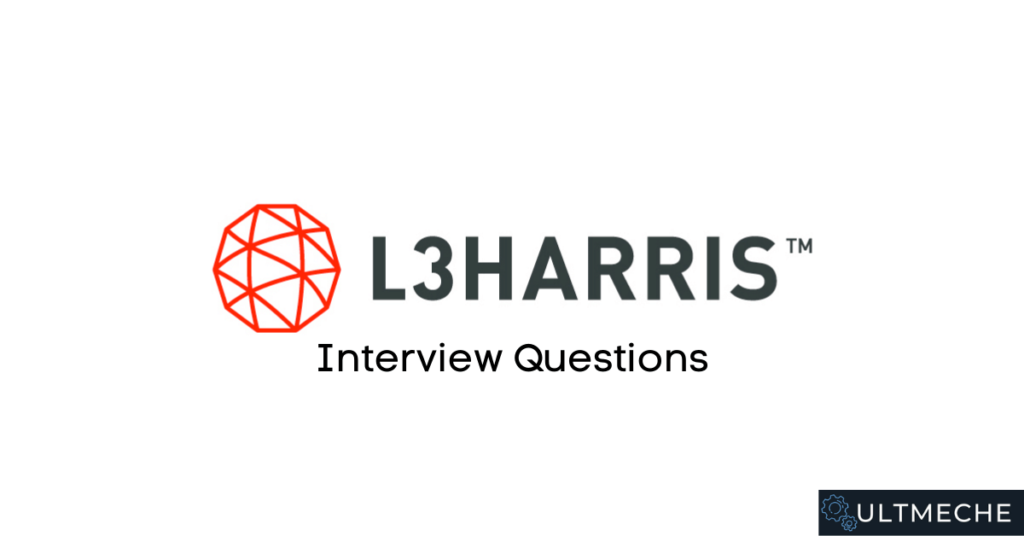I really wish I knew what the L3 Harris Interview Questions were.
Fortunately, I went through the process, and I’m going to teach you how to interview with L3 Harris.

Go over these L3 Harris Interview Questions beforehand to make your life easier.
In the beginning of my engineering career, I attempted to interview with L3 Harris. Like every other engineering student at the time, I was desperate to get a job. I was applying to any and all positions I was remotely qualified for as a mechanical engineer.
Interested in working at L3? Check out L3Harris Intern Salary data (2024).
February 29, 2024What is L3 Harris?

L3 Harris is a defense, commercial, and civil contractor that specializes in cutting edge technology and applications such as:
- Space – Satellites
- Air – Military Aircraft
- Land – Military Vehicles, Tanks, Etc.
- Sea – Submarines
- Cyber – Programs, Systems, and Technology
L3 Harris has supported specific projects such as the James Webb Space Telescope, Launch Vehicle Avionics, military aircraft such as the F-35 and more.
What is it like interviewing at L3 Harris?
L3 Harris is a Fortune 500 company and interviews at companies such as these consist of behavioral and technical questions.
You will need to answer these questions in a STAR format.
The below L3 Harris Interview questions are answered for a Manufacturing Engineering interview.
Even if you’re not in engineering reading this, apply the fundamentals to whichever field you’re in.
Behavioral questions will be answered the same – using the STAR format.
Technical questions will be specific to whichever field or position you’re applying for within the company.
L3 Harris Interview Questions

Tell me about yourself
You will need a solid elevator pitch about yourself to answer this question.
Only answer with items related to engineering – do not include info that is non-relevant about engineering.
“I’m currently a senior mechanical engineering student studying XXX at XXX University. What drew me to mechanical engineering is that I was always interested in math and science and saw myself integrating those 2 principles into my career. A big project that I’m working on regarding mechanical engineering is working on the Formula SAE vehicle. I’m the suspension lead in charge of designing and integrating vehicle drive train and suspension components to ensure the vehicle runs smoothly.”
What are your strengths?
Use the STAR format for this question.
“One of my strengths is explaining things clearly and concisely.
I’d like to highlight a situation where I was responsible for determining the format of a 30 page lab report for our group.
My group kept suggesting things that overall did not add value to the lab report. I strongly held my ground regarding the fact that there’s no point in adding additional info just to add it.
As a result, I was able to reduce the lab report from 30 pages, to 15 pages. I find this a very important skill to practice in the industry given the fact that company documentation practices overall are very scattered.”
What are your weaknesses?
Use the STAR format for this question.
“One of my weaknesses is that I am not very mechanically inclined.
From a lack of experience in a shop environment, I lose concepts such as spatial awareness when I am modeling in CAD.
To combat this weakness, I have joined the Formula SAE team and have had extreme experience in designing and fabricating equipment used in an automotive application. This requires mechanical inclination skills, which I have been able to develop during this period.
As a result, I have contributed to a very high performing suspension to support our Formula vehicle which could hit 100+ mph speeds.”
Tell me about a time you have failed.
Use the STAR format for this question.
“My biggest failure so far as an engineering student was when I had to machine an aluminum dice in a machine shop.
I did not properly fixture the dice onto the machine, and as a result, when I was facing off one of the surfaces, the part came loose.
Fortunately, no one got hurt.
I apologized to the faculty and asked what steps I needed to do after this incident.
I filled out an incident report and to complete the project, I was responsible for supplying material on my own.
Then I went to a foundry, purchased aluminum bar, cut it roughly to size, and was able to finish the project.
A big lesson I learned in this was redundancy – making sure that my torque values were correct.
Tell me about a time you had to stand up to an authoritative figure.
Use the STAR format for this question.
“Our professor was demanding a very harsh deadline on a project.
Given that the professor was also giving us quizzes, lab reports, and a final to study for, this was too much.
I went into office hours and explained my thought process to him. I physically explained that this was not possible given the amount of hours needed to complete the project.
As a result, he loosened up some deadlines and sent a broadcast email to the class.”
What would you do if you had two technicians for you with differing views on building something?
Use the STAR format.
“I’d like to highlight a situation where we were building a load train at the company I was interning for.
I had 2 technicians supporting the build for me at the time.
They both had differing views on what should be done.
I gave them the build procedure to follow.
What I did was I listened to what both parties had to say.
Then I used my engineering decision making to decide which one made more sense in a more mechanical standpoint.
I told both of the technicians that we will do what technician 1 says and if that doesn’t work we will do what technician 2 says.
That resolved the issue we had and we were able to continue with building up the load train for our testing needs”
Are you familiar with soldering?
Say yes and answer about specific examples of soldering pertaining to your experiences.
If you are not and you’re reading this L3 Harris Interview Question guide, start watching soldering videos on YouTube and be prepared to explain what it is and important applications of it.
Are you familiar with CAD?
Say yes and answer about specific examples of CAD pertaining to your experiences.
As a lead in Formula, I’m required to design and manufacture components for our vehicle. This includes components such as sprockets, engine casings, springs, tie rods, and many other automotive parts.
What is GD&T?
GD&T stands for Geometric Dimensioning and Tolerancing.
“GD&T defines a set of standards that we can use to define how much variance we can have in our parts.
In theory, the parts we design are perfect, but in reality, this is impossible.
Due to error such as human or machine, we need to know how to deal with error in real life.
GD&T allows us to do so.”
See more of our specific GD&T Interview Questions.
On a scale of 1-10, what is your skill in programming?
Best to answer something like a 7 or 8 and give the interviewer an exact example of how you’ve applied the skill.
If professional level and are able to utilize it in day to day functions, give yourself a 9.
If very senior and have proven accomplishments in the industry, give yourself a 10.
“I would give myself a 7 on programming. Although I can create MATLAB scripts and very capable spreadsheets on Excel using VBA, I still have much to learn.”
On a scale of 1-10, what would you rate yourself in CAD?
Best to answer something like a 7 or 8 and give the interviewer an exact example of how you’ve applied the skill.
If professional level and are able to utilize it in day to day functions, give yourself a 9.
If very senior and have proven accomplishments in the industry, give yourself a 10.
“I would give myself a 9 on CAD. I’m very comfortable using CAD and have designed systems in many mechanical applications such as oil and gas, agriculture, aerospace, defense. Some specific products I’ve designed are vertical turbine pumps, military aircraft components, automotive engines, and more.”
On a scale of 1-10, what would you rate yourself as an engineer?
Best to answer something like a 7 or 8 and give the interviewer an exact example of how you’ve applied the skill.
If professional level and are able to utilize it in day to day functions, give yourself a 9.
If very senior and have proven accomplishments in the industry, give yourself a 10.
“Overall, if I’d have to rate myself as an engineer, I’d give myself a 7. I’m competent enough to do day-to-day tasks as an engineer and I understand that there is lots to learn and apply. I have been able to complete every problem that I have come across and have developed strong engineering problem solving skills. I’m confident that I can complete any engineering problem given to me with the right resources and problem solving framework.”
My Experience interviewing with L3 Harris
Unfortunately, as this was very early on in my career, I did not get the job. I did not have the right amount of interview experience at the time and I did not understand important interviewing frameworks.
I thought the “On a scale of 1-10” questions are very awkward, but the above is the framework I would use to answer those.
If you need interviewing help, we offer career coaching for interviews.
When you’re interviewing at an F500 company that is responsible for large scale engineering products, you need to have something to bring to the table.
Check our mock interviewing service out.
About the author

Kazuyoshi Fujimoto, PE
Founder | Engineering Career Coach | Principal Mechanical Engineer
Kazu oversees all of ultmeche’s engineering services. He provides consulting such as resume reviews, rewrites, mock interviews, and all services career related. Additionally, Kazu performs consulting work regarding Oil & Gas, Automotive, and Aerospace & Defense. Kazu is licensed as a professional engineer in the state of California and has 9+ years of experience in Oil & Gas, Automotive, and Aerospace & Defense.

2 thoughts on “L3 Harris Interview Questions”